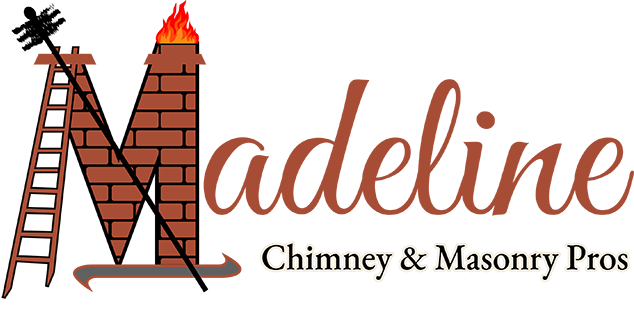Chimney Relining
Madeline Chimney & Masonry Pros Offers Safety Inspection & Chimney Relining Services
Here at Madeline Chimney and Masonry Pros located in College Park Maryland provides complete chimney relining services to Maryland and DC homeowners. We specialize in chimney relining and chimney repairs to ensure you and your family can enjoy your fireplace or wood-burning stove safely.

What Are Chimney Liners?
The lining is one of the most important parts of your chimney, protecting you and your home from heat, corrosion, and fire. The liner, usually made of clay, cement, or metal, serves to contain the combustion products and direct them outside without the danger of eroding the chimney or spreading heat and fire to adjacent woodwork. Without a liner, the byproducts of combustion eat away at the brick and mortar of a chimney, significantly reducing its lifespan. As the chimney deteriorates, the likelihood of heat transferring to nearby woodwork increases, greatly increasing the chance of a fire.
Installing liners with chimneys has been a requirement for many decades now, but if you live in a very old home, it’s possible you don’t have a lining. If that is the case, you should get one installed immediately to allow you to continue using your fireplace safely. Chimneys that are venting oil furnaces and other modern heating systems should always have a CHIMNEY LINER that is in good order. Quite a few masonry chimneys that we inspect, not only have old or DAMAGED LINING in them, or they have no lining at all. Many of them are just hooked up to old brick FLUE LINERS that were never meant to carry fumes from forced air heating systems. If you have an UNLINED CHIMNEY you can in most cases install a new STAINLESS STEEL LINER through the old UNLINED CHIMNEY, or if your chimney has a liner that is old or damaged it can be RELINED, and repaired.
Do I Need to Have My Chimney Relined as Part of My Chimney Repair?
Depending on the age and regular maintenance of your chimney, you may not need to have your chimney relined along with other repairs. Most types of chimney liners deteriorate with age, making it dangerous to use your fireplace. If you’re not sure whether your chimney needs relining, our skilled technicians at Madeline Chimney and Masonry Pros can come examine the lining for any cracks or other damage. If there is damage, you will need to get it relined before you can safely use your fireplace. For maximum results, call Madeline Chimney and Masonry Pros for an inspection of your liner and check your brick for repairs.

Types of Chimney Liners
STAINLESS STEEL LINERS can ensure the safety of your masonry chimney by providing you with a continuous STAINLESS FLUE from your furnace, water heater, or wood stove to the top of the chimney. They are on the first line of defense against CHIMNEY FIRES, deadly fumes, and creosote build-up. With proper CHIMNEY LININGS and care, CHIMNEY FIRES are entirely preventable. CHIMNEY LINERS come in ridge and flexible formats, chose the CHIMNEY LINER that is best for the type of fuel that you are burning and make sure that it is designed for the job it was meant to do. It’s always a good idea to insulate a METAL FLUE with a wrap or jacket that is designed for that purpose since the flue temperatures on high-efficiency furnaces are typically lower. This will help maintain higher temperatures within the METAL FLUE, and reduce corrosive condensation. This adds a measure of safety to your RELINED CHIMNEY and that is what it’s all about. Give us a call for a free inspection of your CHIMNEY, and FLUE LINER.
Chimney Liner Construction
Chimney liners are usually made from clay, metal, or cast-in-place cement. The type you choose for your relining your chimney depends on the fuel burned, the type of existing liner, and your budget. At Madeline Chimney and Masonry Pros in Maryland, our experts will talk with you through the options to determine which is the right choice for your chimney.
The most common type of chimney liner largely because they are the least costly, are readily available, and perform well for properly maintained open fireplace chimneys. Clay tile flues can easily last 50 years or more if they are installed properly, simply requiring regular cleaning. The downside to clay tiles is that they can crack and split apart more readily than other types of liners. Because they are ceramic, the tiles can’t rapidly absorb and distribute heat evenly, leading to unequal expansion of the tiles. That can cause the tiles to crack and split apart. Clay tiles also can’t adequately contain liquid combustion byproducts produced by modern gas appliances.
Usually made of stainless steel or aluminum and are extremely safe and durable. While clay liners are usually installed when a chimney is built, metal liners are primarily used to upgrade and repair existing chimneys. If you have wood burning, gas or oil appliances or fireplaces, stainless steel will be a suitable choice. Aluminum is meanwhile a less expensive alternative but only works with certain medium efficiency gas applications.
Poured, cement-like products form a smooth, seamless lining for your chimney. Cast-in-place liners are able to withstand all the harmful effects of heat and combustion and have excellent insulation properties. These liners are suitable for all types of fuel and can also improve the structural integrity of aging chimneys by providing reinforcement.
Contact the Chimney Relining Professionals
Here at Madeline Chimney and Masonry Pros, we pride ourselves on providing quality chimney relining and chimney repair to keep you and your home safe. If you think your chimney may need relining, call us today at 301-765-4044.
